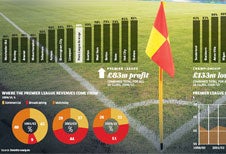And the winner is... the players. Top-flight wages hit record high
Quest for trophies means an unhealthy 68 per cent of Premier League clubs' income goes on salaries

The Premier League's annual revenues have broken through the £2bn mark for the first time, though the inexorable rise in players' wages mean clubs are paying out more than ever before – £1.4bn – to reward those in whom they are placing their faith on the field, Deloitte's annual review of football finance reveals today.
Click HERE to view graphic (223k jpg)
Using figures for the 2009-10 season – the most recent available – the report reveals that the increase in revenues, with television money now exceeding £1bn for the first time, have gone straight back out on wages with a record 68 per cent of Premier League revenues now heading into players' pockets.
The collective wage bill has increased by £64m in just 12 months, taking pre-tax losses at the Premier League clubs after debt servicing and player costs to a record £445m, which means that compliance with Uefa's new financial fair play (FFP) regime looks a huge task for some.
Yet it is the Championship which the Deloitte report implies should give most cause for concern, underlining why the Football League now intends to introduce its own FFP system. The Premier League's wage inflation and collective debt of £3.5bn are at least offset by rising television money but in the second tier, where Deloitte sees a colossal 88 per cent of revenue going on players, a 25 per cent reduction in live television rights from the beginning of the 2012-13 season spells serious danger.
Only three Championship clubs reported a pre-tax profit for the year under review, while 14 in the division lost £5m or more in the desperate drive to reach the golden land of the Premier League and overall losses were a record £133m. Championship clubs are spending £4 for every £3 they generate in income. "Financial history does not bode well," said Alan Switzer, director in Deloitte's Sports Business Group, of the second tier. The Football League's calculation that 80 per cent of player contracts expire before the new Championship TV deals start at least give clubs time to reduce their cost base.
Some second-tier clubs paid out much more in salaries than they earned, Blackpool spending 134 per cent of revenue in their promotion campaign – set against their frugality last season in the top tier. Bristol City, Queen's Park Rangers, Ipswich and Preston all paid out at least 108 per cent of revenue on wages. In the Premier League, only Manchester City exceeded the 100 per cent mark in their breakneck pursuit of Champions League football.
Deloitte, who are accountants to the Premier League and some of its clubs, observe that the "trophy asset" model of club ownership "remains prevalent as competitive pressure to win outweighs any collective desire to limit wage costs." But the biggest factor influencing the future landscape is the financial fair play regime, says Dan Jones, partner of the Deloitte Sports Business Group.
The review observes that the drive towards FFP, which obliges clubs with income and expenses over €5m (£4.5m) to limit losses to €45m (£40m) for the seasons 2013-14 and 2014-15 (and less in future seasons), "will correct the financial situation, starting from the top".
Despite the wage inflation, Deloitte cautions against any forecast of football's financial demise. "Top-flight football has show," Jones said. The Premier League sides' collective operating profits, before player trading, were £101m, while the Serie A clubs collectively lost £110m in the 2009-10 season and France's Ligue 1 £102m. The Football League's own achievements in attracting fans and new financial revenues, which are often overlooked, are reflected in figures showing that the Championship is the third best attended league in Europe, ahead of the top divisions in Spain, Italy and France.
The Premier League's TV deal (including overseas rights) is the key commercial component, increasing from £2.8bn to £3.6bn over the three-year period; while its operating profits have risen by £4m to £83m, the Bundesliga – the only elite European league which is more profitable – has been far less resilient, its profits falling by 20 per cent to £113m.
Some £37m may just have been spent on Sunderland's Jordan Henderson and Blackburn Rovers' Phil Jones by Liverpool and Manchester United respectively, but gross transfer activity fell by more than 20 per cent from the record £713m in 2008-09 to £559m in 2009-10 – perhaps more a reflection of the fact that credit was less likely to be available to clubs in that financial climate.
Join our commenting forum
Join thought-provoking conversations, follow other Independent readers and see their replies
Comments
Bookmark popover
Removed from bookmarks